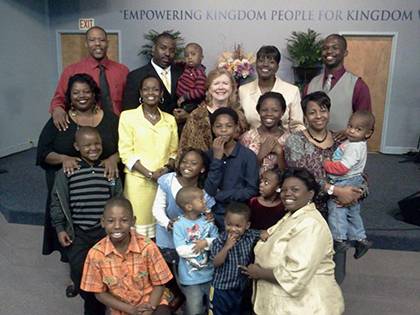A Special Friendship in the Civil Rights Era
A Duke employee shares a story about a family bond formed in Durham

Janice Oliver Belcher’s and Judy Cantey’s friendship began in 1964, the same year the Civil Rights Act was signed into law by President Lyndon B. Johnson and called for integrated schools and public facilities.
Janice was 8 years old at the time, the daughter of a black Durham housekeeper. Judy, a white physical therapist and former Duke student, worked at Duke Hospital.
Janice’s mother, Martha Elizabeth Flowers Oliver, helped clean Judy’s log cabin off Pickett Road in Durham. But when Martha became ill and passed away from pancreatic cancer, Judy decided to spend more time with three of Martha’s children, including Janice.
“It’s the most unlikely thing that would have happened in the ‘60s,” said Janice, now a staff assistant in the Duke Fuqua School of Business Admissions office. ”I know that there were great relationships other than ours that stemmed from the ‘60s, so I’m not pretending that this is unique, but I’ll say that to my life, it’s an amazing story with the handprint of God, and I’m just the more blessed that I was able to experience the good of the racial divide.”

In the 1960s, Janice, her two siblings and her cousins, seven children in total, piled in Judy’s light-green Volkswagen and went on field trips across Durham. They saw the Nutcracker at Page Auditorium and visited the planetarium in Chapel Hill. They visited Judy’s log cabin and played games, celebrated birthdays and sang along to Judy playing the piano.
Janice, who didn’t attend an integrated Durham school until the eighth grade, remembers when stores in Durham were divided for whites and blacks. But when she and her family were spending time with Judy, she doesn’t remember witnessing any disapproving reactions from the public.
Now, 50 years later, Janice and Judy still see each other throughout the year in North Carolina or in Montgomery, Alabama, where Judy now lives and where she grew up. They’ll go to dinner or the movies and have candid conversations about racial issues that still exist today in the U.S.
“It was building a tie that has never really been broken,” said Judy, who’s now semi-retired. “Janice started bringing her whole family down here on a regular basis. The friendship just deepens. It is like having a daughter.”
“We grow closer as we get older,” Janice added. “We value even more of what has transpired between the both of us. Judy was an only child from Montgomery, Alabama, where there was so much racism. So many things could have caused her to look at three young black children and say I don’t have time for them, but when we met, it was instantly a connection…Her heart was gold.”